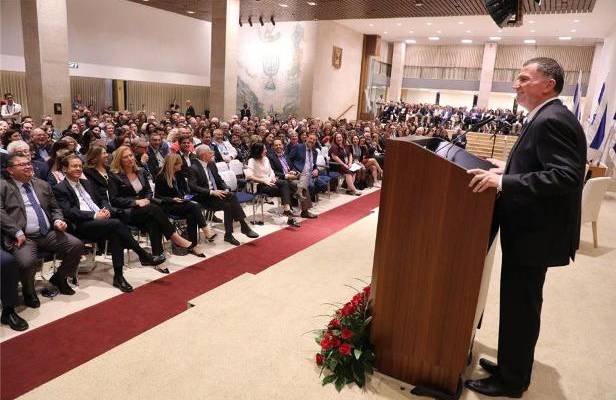“The Knesset is—and will remain—a beacon of democracy, and the commitment to these values is shared across the political spectrum,” Edelstein stated.
By: United with Israel Staff
Knesset Speaker Yuli Edelstein defended Israel’s vibrant democracy, stating that “the rumors of the death of Israeli democracy are greatly exaggerated.”
Speaking during an event held at the Knesset on Tuesday as part of the Jewish Federations of North America General Assembly, Edelstein spoke of the recently passed Nation-State Law, which some claim hinders Israel’s democracy, and quipped that “unfortunately, you have heard that some legislation is ruining
Israeli democracy. To paraphrase Mark Twain: the rumors of the death of Israeli democracy are greatly exaggerated.”
“As Speaker of the Knesset, I can assure you that nothing could be further from the truth. The Knesset is—and will remain—a beacon of democracy, and the commitment to these values is shared across the political spectrum,” he added.
The nation-state law defines Israel as the Jewish state by law and enshrines its unique Jewish character.
After the passage of the law in July, Prime Minister Benjamin Netanyahu explained its significance, noting that “the State of Israel is the nation-state of the Jewish people, with full equal rights for all of its citizens. This is the meaning of the words ‘a Jewish and democratic state.’”
Israel’s democracy, the only true democracy in the Middle East, has a vibrant parliament where lawmakers, including Arab Members of Knesset, are free to criticize and denounce Israeli leaders and policies without fear of intimidation and retribution.
Fostering New Connections to Ancient Traditions
During the event, attended by some 700 Jewish leaders from North America, Edelstein also highlighted the recent “renaissance of Jewish learning, likely unprecedented in both extent and diversity, and fostered new connections to our ancient traditions.”
He said lauded the Jewish Federations of North America for having “been there throughout, to support, to help, to guide—and to challenge, as well. As we look to our shared future, I know we have strong foundations on which to build.”
Addressing the bonds between Israel and the Jewish Diaspora, Edelstein said that “it saddens me greatly that discussions of Israel and Zionism have become so painful as to be nearly taboo.”
“Sometimes, this feels paradoxical to me. We hear that Jewish students on campus distance themselves or become very critical of Israel because of the country’s policies towards its neighbors or certain religious denominations. But somehow, you bring those same students to Israel on a birthright trip, and suddenly they completely change their mind. I don’t believe one single cause can explain this rift. But we must not respond by searching for scapegoats,” he said.
“It is true, as the title of this conference suggests, that we need to talk. But even more so, we need to hear each other—to listen with our hearts, not only our ears,” Edelstein concluded.
